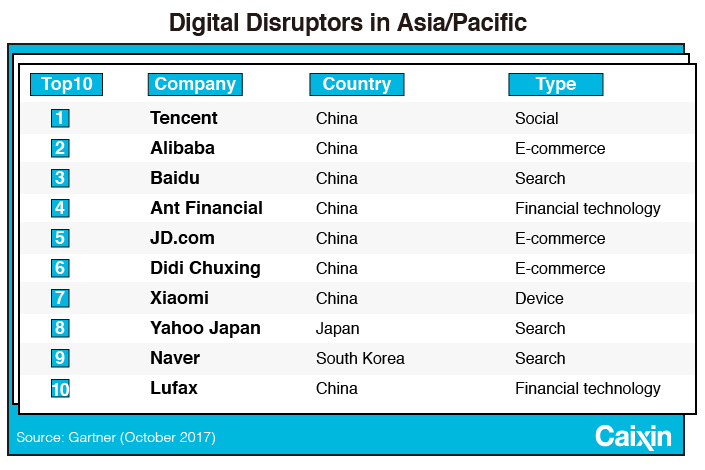China Leads Asia in ‘Digital Disruption,’ Report Says

Eight of the top 10 “digital disruptors” in Asia came from China according to a new list by a leading industry consultant, underscoring the country’s role in producing some the region’s leading and most cutting-edge high-tech firms.
China’s top three internet companies — Tencent Holdings Inc., Alibaba Group Holding Inc. and Baidu Inc. — finished in the top three spots in that order on the list, compiled by Gartner Inc.
The research and advisory firm defined digital disruptors as “any entity that affects the shift of fundamental expectations and behaviors in a culture, market, industry or process that is caused by, or expressed through, digital capabilities, channels or assets.”
Fourth and fifth on the list were Ant Financial Services Group, the financial affiliate of Alibaba, and e-commerce company JD.com Inc. respectively. Other companies that made the list were private car services firm Didi Chuxing at No. 6, smartphone maker Xiaomi Inc. at No. 7, and peer-to-peer lender Lufax at 10th.
The only non-Chinese companies on the list were search giants Yahoo Japan Corp. and Naver Corp. of South Korea.
Gross domestic product “growth in Asia/Pacific is 1.6 times faster than the worldwide market,” Gartner research director C.K. Lu said. “Adoption of technologies like mobile wallets is much higher, and you can reach 1.7 billion internet users in these markets. As Chinese and American digital giants battle to disrupt global markets, no one can afford to sit on the sidelines.”
 |
As these companies’ influence grows, 80% of traditional firms will lose 10% of their market share from such “disruptive” competitors, Gartner predicted.
“Each digital disruptor claims a unique stake in the digital business ecosystem of Asia, and is only growing from strength to strength,” Lu said. “Chief information officers and information technology leaders need to ask if they are suitable candidates to collaborate with or compete against — ignoring them is not an option.”
Contact reporter Yang Ge (geyang@caixin.com)

- 1Update: China’s First-Quarter GDP Growth Beats Expectations at 5.3%
- 2Cover Story: Alibaba Renews Strategy Reset to Revive Growth Momentum
- 3Alibaba Diverts from New Retail Push in Strategy Reckoning
- 4Exclusive: Chinese Insurer’s Ex-Chairman Disappears From Public View, Sources Say
- 5In Depth: Chinese Education Firms Learn Tough Lessons Overseas
- 1Power To The People: Pintec Serves A Booming Consumer Class
- 2Largest hotel group in Europe accepts UnionPay
- 3UnionPay mobile QuickPass debuts in Hong Kong
- 4UnionPay International launches premium catering privilege U Dining Collection
- 5UnionPay International’s U Plan has covered over 1600 stores overseas






